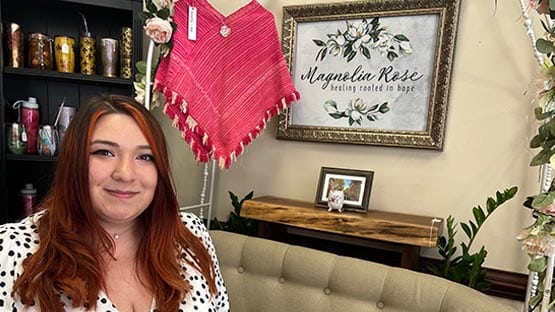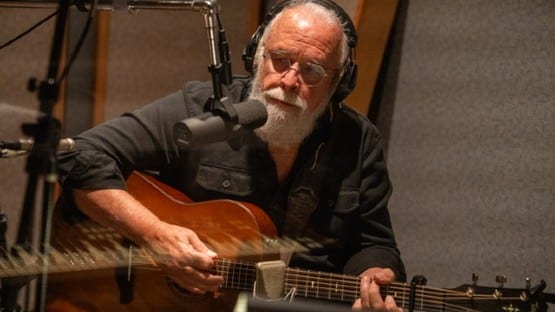
A shingle and retail store on Main Street have gone a long way in helping Magnolia Rose, a Waynesboro-based nonprofit dedicated to helping victims of human sex trafficking, spread the word about the organization.
Founded in 2020 by Jessica Garcia and Kristan Crummett-Dollar, Magnolia Rose has grown to include a retail store at 417 W. Main St. in downtown Waynesboro with vendors selling their wares, and the nonprofit getting a portion of the sale, usually around 20 percent. The vendors also pay a small rental fee for their space ranging from $25 to $200.
“The storefront has been an amazing asset to us, because we finally have a hub where the public can come talk to us and get to know our mission,” said Garcia, taking a break from manning the retail shop to talk with AFP Thursday afternoon. “I think a lot of people don’t think human trafficking happens in the Shenandoah Valley, including Waynesboro.
“I think people think it doesn’t happen in rural areas, that it can’t happen in their small town, but it does,” Garcia said. “And being able to acknowledge that it’s happening helps us prevent it in the future.”
Survivors are usually teamed up at the storefront with volunteers – allowing the public to meet them directly and ask questions and give a voice to what they’ve experienced.
In addition to volunteering time with the nonprofit and organizing a monthly meetup for people who want to find solutions to human trafficking, Garcia and Crummett-Dollar have day jobs. Well, not exactly day jobs. Garcia works from 7 p.m. to 3 a.m. for the National Sexual Assault Hotline. Crummet-Dollar works in the Waynesboro Commonwealth’s Attorney office.
When the founders aren’t working their paying jobs, they are rolling up their sleeves to tackle sex trafficking in the Valley – fielding calls from hospitals as well as police departments up and down Interstate 81 from Winchester to Roanoke. This month, they’ve already had 12 calls for assistance with victims ranging in age from 16 to 24.
Emergency apartments
The nonprofit now has two emergency apartments that are typically for short-term stays until a permanent solution is found. The immediate goal is to help the victim detox, because they are often controlled by drugs or alcohol from their pimp, Garcia said. Once that is under control, there are usually more options for housing and addiction treatment.
When the Virginia State Police or other agencies find a victim in the Shenandoah Valley, their first call is usually to Magnolia Rose.
“And we can go pick her up and bring her back and make sure she has shelter,” Garcia said. “We provide resources. Most of the time they have no where to go so they’re gonna be coming back with us.”
Mobile response unit
A new partnership with Augusta Health also brings a mobile response unit to the victims 24 hours a day. A nurse, nurse practitioner or a doctor come to the apartment, assess the victim and help get them on the path to being healthy.
“We started discussing with them (Augusta Health) our need, because we were finding victims, and before we had our apartments, other shelters would not take the survivors because they were still actively high,” Garcia said. “You don’t want to keep someone in a hospital for days on end so we made a decision together.”
To date, the mobile unit has treated two or three people, Garcia said, noting the program just started this month.
Teen drop-in center
Another new plan for the organization is to work with at-risk teens on preventative services in the area. In addition to speaking engagements at local schools, the nonprofit will operate a drop-in center at their location in Waynesboro “to provide a healing space for girls that either have already experienced exploitation, or to prevent it for girls that are really high risk.”
Referrals for the drop-in center will come from local courts although the exact intake process is still in the works.
“They’ll be able to come here and get tutoring, counseling, mentorship and other services, just to help them thrive.”
Teens are often at risk for sex trafficking because they may not have the best home life and are more easily lured away with promises from a pimp, who often pretends to be their boyfriend at first, and makes false promises to them. Sometimes trafficking is done by a family member or a landlord demands sex in exchange for unpaid rent.
“They usually don’t realize what’s happening until it’s too late,” Garcia said. “We want to give them the tools and knowledge they need to prevent that from happening to them.”
The future for Magnolia Rose
The nonprofit has come a long way in a relatively short period of time.
“I think what I’m most proud of is that we’ve been very dedicated to make sure these initiatives are survivor led,” Garcia said.
The Augusta Health mobile unit came about because a survivor graduated from the program and wanted to find a way for others to get medical care. She went to Augusta Health and shared what she went through. Another survivor has plans to speak to the Attorney General’s office next week to ask for more services in this part of Virginia.
Another goal for the organization is to have a home for survivors in the region which will likely cost around $200,000.
“We want an emergency shelter home to help women recover,” Garcia said. “We’re at that tipping point that now that a lot of people know about us, we’ve been having to relocate certain survivors because we don’t have the space.”
Garcia said they don’t like to turn anyone away, so when they don’t have the space, they work with partners in different regions of Virginia, and even out of state, to find bed space and then provide transportation to get the victim there safely.
The house would provide a place that feels comfortable and inviting instead of a clinical location that may feel cold to victims who have already been through so much – and spent months or years in cars and hotel rooms.
“Our hope is to fundraise enough money to eventually buy a home with some land that we can put a garden and have other therapy options for them.”
Volunteering with Magnolia Rose
Garcia said that she is really proud of the headway the organization has made in the region – but they couldn’t do what they do without the help of volunteers and other agencies including Augusta Health, the Valley Children’s Advocacy Center, New Directions and the Community Foundation of the Central Blue Ridge, to name a few.
Volunteers go through a training and background check, and then set their own hours, working in the retail shop, organizing a fundraiser, serving on the board or even helping mentor a survivor.
“I think a lot of people think they can’t help. They hear human trafficking and that sounds really scary,” Garcia said. “But they can help the survivors. A lot of times what our volunteers do for survivors is just be with them. When you don’t have family or friends around you, it’s really hard to heal.
“And it lets the survivor know that there really is a community that is safe and cares about them.”
Related story
Somebody else’s problem: Waynesboro nonprofit tackles sex trafficking in the Valley
The girl, pregnant, didn’t know where she was, just that the men in the box truck had dropped her off at a hospital. She was of no use to them anymore. Sex traffickers don’t make money selling guys on having sex with pregnant teens. She was somebody else’s problem now.










